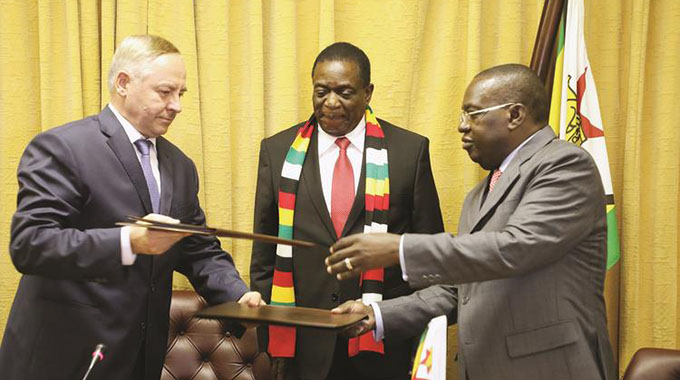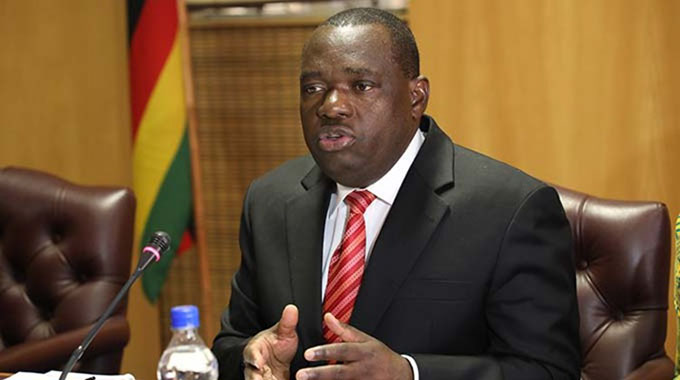Foreign Affairs: Engaging, re-engaging the world for prosperity

Elliot Ziwira Senior Writer
Zimbabwe’s Independence in 1980 has not only given articulation to the majority’s once-upon-a-time stifled voice, but gave the nation State a chance to mark its spot on the global landscape through a robust foreign policy.
The country’s Independence meant more than freedom to its citizens, as the need arose to also consider the plight of fellow Africans who were still burdened by the colonial yoke. With fellow brothers and sisters crying out in the wilderness of South Africa and Namibia, the revolution was considered not yet over.
Therefore, Zimbabwe arrival’s on the scene changed global politics.
Zimbabwe played a crucial role in the decolonisation of Africa through intervention in Mozambique to end the apartheid South Africa sponsored civil war meant to destabilise the region; rallying African solidarity in organisations like SADC, COMESA, African Union, Non-Aligned Movement and the United Nations.
The country’s role as a member of the Frontline states in spearheading the struggle for the liberation of all African countries cannot be overemphasised, as the decolonisation of indigenous peoples across the continent informed foreign policy in the 1980s and early 1990s.
Until all people of colour were free, Zimbabwe vowed to up the ante. The Ministry of Foreign Affairs (now the Ministry of Foreign Affairs and International Trade) played a pivotal role in relaying to the world the country’s foreign policy of engagement; politically, socially and economically.
Born in 2018 for synchronisation of key components of engagement, the Ministry of Foreign Affairs and International Trade is headed by Dr Sibusiso Moyo who is deputised by Honourable David Musabayana with Ambassador James Manzou as the Permanent Secretary.
Mandate
Inspired by the vision to create necessary conditions for a prosperous, peaceful nation, and an effective participant in the community of nations, the ministry’s obligation is to see to it that all Zimbabweans benefit by focusing on economic variables of international engagement.
Patriotism, loyalty, integrity, professionalism, commitment, courtesy and honesty are the values and principles that motivate the ministry in its quest to deliver tangibles to citizens.
Functions
The Ministry of Foreign Affairs and International Trade endeavours to promote the political and economic interests, image and influence of the Republic of Zimbabwe in the international community; and to protect the interests and safety of Zimbabwean nationals abroad.

Minister Moyo
The ministry is obligated to implement Zimbabwe’s foreign policy as pronounced by His Excellency, the President; promote Zimbabwe’s economic, political, social and cultural interests; ensure compliance with continental and regional treaties, agreements and protocols; and maintain communication with the country’s diplomatic Missions abroad as well as those Foreign Missions based in Harare.
It is also the ministry’s duty to provide timely advice on foreign policy matters, and implement policies in line with regional and continental integration; conduct negotiation of agreements governing political, economic, social and cultural relations with other countries; facilitate the issuance of all official documents such as ordinary, service and diplomatic passports, temporary travel documents, Police clearance, birth certificates, and national IDs.
To fulfil its mandate to the people of Zimbabwe, the Ministry of Foreign Affairs and International Trade facilitates deportation of foreign illegal immigrants; offer Consular Services to all Zimbabweans as well as Missions abroad and in Harare; and provide timeous and quality protocol and conferencing services to the Government and the Diplomatic Corps.
Historical background
White settlers considered Rhodesia their nation; a European nation, therefore, their foreign policy served colonists’ interests.
Two separate nationalisms existed in Rhodesia; White Nationalism and Black Nationalism.
Rhodesian-ness was defined by whiteness; when “most Whites referred to ‘Rhodesia’ they meant ‘White Rhodesia’, and when they referred to ‘Rhodesians’ they meant themselves. Blacks were classified either as ‘Black Rhodesians’—sometimes as ‘our Black Rhodesians’”, reveal Peter Godwin and Ian Hancock in the book “Rhodesians Never Die: The Impact of War” (1993).
Rhodesian-ness referred to being “British imperials”, with “the sense of the South African cultural idea” (Schutz cited in Godwin and Hancock, 1993:19).
This means white Rhodesians owed their material claims to the empire, and their cultural assertions to apartheid South Africa, Cecil John Rhodes’ Launchpad for the colonisation of Zimbabwe; the African nation.
Hence, their quest to mould everything along the British model – to recreate their ancestral heritage of plunder; a status quo they wished to maintain. They insisted on the South African “cultural idea” that allowed them to uphold values of white Rhodesia.
Rhodesians’ interaction with the community of nations was premised on values of whiteness which linked them to apartheid South Africa, Europe and America. That was what informed their foreign policy; the upholding of settler values.
Black people’s triumph over colonial subjugation upset the status quo, hence most whites either remained hooked to the past or moved to South Africa, New Zealand, Australia, United Kingdom, United States of America or Canada. They simply could not stomach the idea of being led by the same “terrorists” who engaged them in the trenches of struggle.
Most white Rhodesians, Godwin and Hancock (1993) reveal: “Were bewildered or devastated by the news of Tuesday, 4 March 1980”, because they were expecting “to hear that the moderate and pliable Bishop Muzorewa would form the first Black government of the new Zimbabwe” (Godwin and Hancock, 1993:1).
Smarting from the reality that “the happiest Blacks in the world” (ibid), had voted for Mugabe, “a monstrous evil”, they were left with “three clear options” (ibid).
The decision on the options were the major setbacks to the new Government’s slant towards reconciliation. Godwin and Hancock (1993) point out: “Mugabe’s election victory presented the Whites with three clear options: they could pack up and leave; they could remain behind, live in the past, and effectively become expatriates in their own country; or they could emigrate with their hearts and minds to the new Zimbabwe” (Godwin and Hancock, 1993:3).
The dilemma of “to be or not be” (William Shakespeare in “Hamlet”) a Zimbabwean, became a heartache to Rhodesian bigots.
Because whites lived an illusion; the delusion of Rhodesia, it never occurred to them that there would be majority rule (never in a thousand years as Ian Smith vowed) in Zimbabwe. Their belief was that: “If the chaps from the bush win the elections, I tell you there will be a mass exodus of whites from this country. That will be the end of the economy, as we know it won’t it? We will go the same disastrous way as Angola and Mozambique; civil war and a ravaged economy. . .the return to barbarism” (Maruma in “Coming Home” 2007:36).

Permanent Secretary Manzou
The “prophesied” exodus left a gap that needed to be filled in key institutions for the newly independent nation State of Zimbabwe to map its own destiny. Thus, a foreign policy that would dovetail with national aspirations had to be formulated.
So what is foreign policy?
Foreign policy is defined as the general objectives that guide activities and relationships of one state in its interactions with other states.
It is the prerogative of the Head of State and Government to craft and enunciate as well as set the parameters of Zimbabwe’s foreign policy. Parliament too inputs directly into the country’s foreign policy through debates and ratification of bilateral and international treaties and agreements.
Other Government ministries, the Ministry of Defence and War Veterans Affairs, for instance, also contribute to the creation, shaping and refining to the country’s foreign policy, although the Ministry of Foreign Affairs and International Trade plays a principal role.
In Zimbabwe’s case, foreign policy comprises goals aimed at outlining and reinforcing how the country interfaces at official level with other countries; regional, multinational organisations and institutions as well as non-state players in pursuit of national economic, political, social and cultural interests.
Constant monitoring and assessment of shifting trends in global politics, guarantee that Zimbabwe realises maximum benefit from its international relations; and promotes or influences change in the policies, attitudes or actions of others. Among many others, such advances may obtain in economic, political, social or military spheres.
Like any other country, Zimbabwe’s foreign policy endeavours to advance the country’s policy objectives on the global arena. Alive to the fact that national interests are the fulcrum of any country’s foreign policy as they drive its conception, Zimbabwe’s (foreign policy) is an extension of its domestic policy.
A peek into Zimbabwe’s foreign policy
Zimbabwe’s history of struggle against colonialism cannot be eclipsed, which is the reason why the country’s foreign policy objectives are profoundly entrenched in the principles of the liberation war. Safeguarding the country’s sovereignty and territorial integrity, the defence of its esteem and image as well as the search for policies that promote social justice for all, are some of the Motherland’s intents. The commitment to attain equitable standards of living for all Zimbabweans drive the nation State’s foreign policy.
On the global stage Zimbabwe is guided by anti-imperialism, anti-colonialism and the formation and upkeep of an international milieu conductive to peace and security so as to ensure the attainment of set development goals.
Milestones in foreign policy since 1980
Independence brought a new dimension to engagement with the new nation State of Zimbabwe joining the community of nations as a sovereign member. Hinging on the talents of her sons and daughter’s in the Diaspora, the Motherland sought to Africanise the civil service.
During these formative years, the foreign policy pursed was meant to tap into the vast pool of talent abroad by encouraging citizens in the Diaspora to come home and develop their country.
To boost the country’s qualified personnel, particularly in critical areas like health and education, sending students to Cuba became one of the hallmarks of Zimbabwe’ foreign policy.
The conception of Bindura University of Science Education was necessitated by that slant. The university was setup with Cuba’s assistance to help the country train its own personnel, instead of sending them abroad.
As a strong member of the Frontline states, total independence of the entire African continent became Zimbabwe’s focus in the 1980s and early 1990s, hence the foreign policy pursued around that period.
Through provision of sanctuary and other supportive services for freedom fighters from the Southern African region, the dream to free all the peoples of Africa from colonial clutches was realised.
Economic emancipation through land ownership was another key driver of Zimbabwe’s foreign policy. Because land to Africans in general, and Zimbabweans in particular, is vital to livelihood routes, its loss through colonialism has been a cause for concern.
The liberation struggles; the First Chimurenga of 1896-97 and Second Chimurenga of the 1970s, were all precipitated by the endogenous people’s quest to reclaim their land. Independence, therefore, meant the return of land to its legitimate owners.
Correcting colonial inequalities became the Government of Zimbabwe’s immediate concern, therefore, legislation had to be enacted to achieve that, and a foreign policy framework enunciated to advance the right of Zimbabweans to their ancestral heritage.
The ZANU policy statement of August 21, 1963, committed the party to, among other resolutions, “repeal the Land Apportionment Act, the Land Husbandry Act, and to replace them with a new Land Redistribution Law; to create a National Land Board to effect an equitable redistribution of land and abolish the de-stocking of cattle” (Zvobgo, 2017:11).
The Patriotic Front, therefore, “had plans to embark on a massive and ambitious land redistribution programme under which 170 000 families in the Tribal Trust Lands would be resettled” (Maruma, 2007:5) on land in the hands of 6 000 white commercial farmers.

Deputy Minister Musabayana
The stumbling block, however, was a clause in the Lancaster House negotiated Constitution of 1979, which compelled Zimbabwe to repossess land in the hands of white Rhodesians on a willing-seller-willing-buyer basis. The clause was among a “series of compromises over minority rights, in particular on the future of land ownership” (Raftopoulos and Mlambo, 2009:xxviii) to be respected for a period of 10 years.
To honour its pledge to the people of Zimbabwe, without falling foul of the Constitution, the Government had to source funds from friendly countries to pay for the land, especially so when the United Kingdom reneged on its Lancashire House pledge after Margaret Thatcher’s departure in 1990. A foreign policy that would help Zimbabweans project their land reform story to the world was required during this period.
The ministry played a crucial role in mobilising international financial assistance for resettlement schemes in the early 1980s, 1990s; and the post-2000 Fast Track Land Reform Programme.
In the 1980s, 1990s and early 2000s, Zimbabwe’s foreign policy was mainly focused on political emancipation and solidarity through multilateralism.
Since the birth of the Second Republic in November 2017, there has been a remarkable shift in foreign policy to concentrate more on economic or commercial diplomacy that would translate into tangibles for citizens. Engagement and re-engagement are now the mantra as Zimbabwe extends open arms to the world.
Taking foreign policy to another level, the New Dispensation angles against sanctions without necessarily being belligerent, but through re-engagement where mutual respect prevails. The illegal sanctions imposed on the country by the West have brought suffering to ordinary citizens of Zimbabwe, hence, the heightened push to have them removed.
Promotion of trade and investment that will subsequently translate into deliverables for the well-being of Zimbabweans is the philosophy behind the shift in foreign policy as politics alone cannot cut it. Cognisant of the crucial import of the Diaspora, the ministry engages Zimbabweans abroad imploring them to invest at home, and help in the development of their country.
Trade agreements
Since Independence in 1980, Zimbabwe has taken note of the essence of trade agreements in the provision of affordable goods to citizens.
A trade agreement stimulates and encourages trade between countries or group of countries who are signatories, by giving one another preferential treatment in the reduction or removal of customs duties. This has the effect of lowering prices and allowing products to become competitive in the importing markets.
Zimbabwe has preferential Bilateral Trade Agreements with Botswana, Malawi, Namibia and Mozambique. Qualifying products enter the territory of one another without the payment of customs duty.
The country is also a member of Regional Trade Agreements, which are; the Southern African Development Community (SADC) Trade Protocol, and the Common Market for Eastern and Southern Africa (COMESA) Free Trade Area; COMESA-EAC-SADC Tripartite Free Trade Area and the Africa Continental Free Trade Area (AfCFTA).
Qualifying products enter the territory of signatory Member States without payment of customs duty.
The Interim Economic Partnership Agreement allows products from Zimbabwe quota and duty free access when exported into the 28 Member States of the European Union (EU).
Preferential Bilateral Trade Agreements
Currently Zimbabwe has four operational preferential bilateral trade treaties which are: Zimbabwe and Botswana; Zimbabwe and Malawi; Zimbabwe and Mozambique; and Zimbabwe and Namibia.
Ratified in 1988, the Zimbabwe-Botswana Bilateral Trade Agreement allows for mutual duty free trade on all products grown, wholly produced, or manufactured entirely or partly from imported inputs subject to a 25 percent local content requirement.
Instigated in 1995, the Zimbabwe-Malawi Bilateral Trade Agreement aims at facilitating economic activities between the two countries and contributing towards economic expansion. The agreement provides for duty free items with at least 25 percent local content from signatories.
Malawi informed of its sensitive list of products, namely; granulated sugar, table eggs, dressed chickens, fresh milk and cooking oil.
In January 2004, Zimbabwe signed a Bilateral Trade Agreement with Mozambique which was effected in March 2005. The objective of the agreement is to eliminate tariff and non-tariff barriers, and to cooperate in customs and trade promotion.
It provides for duty free trade between the two parties with rules of origin stipulating a 25 percent domestic value addition.
Refined and unrefined sugar, Coca-Cola/Schweppes’ soft drinks, firearms, ammunition and explosives, motor vehicles and cigarettes are excluded from the agreement.
The Zimbabwe-Namibia Bilateral Trade Agreement, came into effect in 1992. It is a give-and-take agreement subject to rules of origin requiring at least 25 percent local content for manufactured goods, and that the two members should, as exporters, be the last port of significant manufacturing.
As Zimbabwe turns 40 on April 18, 2020, it is only appropriate to revel in the milestones thus far achieved in upholding the Motherland’s sovereignty and territorial honour in the quest for social justice for all, and provision of tangible gains for the sustenance of livelihoods for all citizens.









Comments